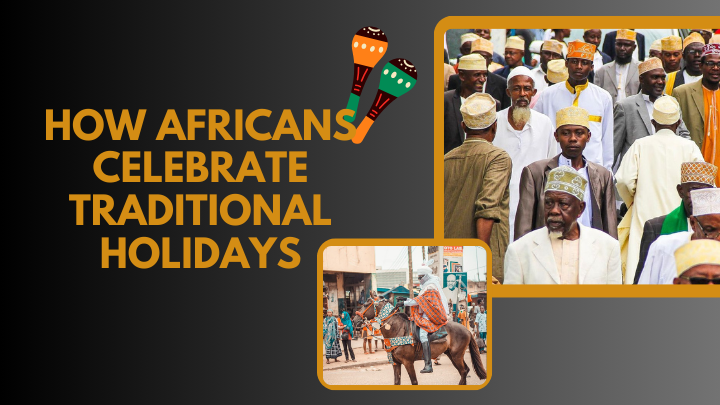Traditional Holidays in Australia
Holidays are a significant part of cultural life, offering a chance for families and communities to come together, celebrate, and reflect on their shared values, history, and traditions. For African communities in Australia, traditional holidays such as Eid, Christmas, and Independence Days are celebrated with a cultural twist—blending African customs with the Australian context, and creating a fusion of cultural practices that honor their roots while adapting to their new home. These holidays are not only a time for celebration but also for strengthening community ties and sharing African heritage with others.
In this article, we explore how African communities in Australia celebrate their traditional holidays, showcasing the unique cultural expressions and adaptations that occur when African traditions meet Australian life.
1. Eid: A Celebration of Faith and Family
Eid is one of the most important religious holidays for many African Australians, particularly those from Muslim backgrounds. Eid al-Fitr, which marks the end of Ramadan, and Eid al-Adha, which celebrates the sacrifice of Ibrahim, are both occasions for prayer, reflection, family gatherings, and community celebrations.
- Prayer and Reflection: On Eid mornings, African Australians, particularly those of Somali, Sudanese, and West African descent, gather in mosques or outdoor spaces for communal prayers. These prayers are often accompanied by a sense of deep spirituality and reflection, as families and communities come together to celebrate the end of a month of fasting (during Ramadan) or to mark the spiritual significance of Eid al-Adha.
- Community Feasts: Food plays a central role in Eid celebrations, and African communities often prepare lavish meals to share with family and friends. Traditional dishes from various African countries are served, such as Sambusas (fried pastries filled with meat or vegetables) from Somalia, Suya (spicy grilled meat) from Nigeria, and Jollof rice from West Africa. These dishes are enjoyed alongside traditional sweets like Baklava and Kunafa, which have become popular in many African Muslim communities.
- Cultural Performances: In cities like Sydney, Melbourne, and Brisbane, Eid celebrations often include cultural performances, where traditional African music and dance are showcased. These performances, combined with Islamic prayers and teachings, offer a space for African Australians to celebrate their faith while embracing their cultural heritage. The celebrations also serve as an opportunity to introduce African customs to the broader Australian community, fostering understanding and appreciation of African cultures.
- Family and Community Bonding: Eid is a time to strengthen family ties, visit relatives, and exchange gifts. Many African Australian families invite neighbors and friends from diverse backgrounds to join in the celebration, sharing food, conversation, and laughter. The holiday is marked by warmth, hospitality, and a spirit of inclusivity, showcasing the generosity and togetherness of African cultures.
2. Christmas: A Fusion of African and Australian Traditions
For African Australians who are Christian, Christmas is another major holiday celebrated with a unique cultural twist. While Christmas traditions in Australia include the typical summer barbecues and beach outings, African communities often bring their own vibrant and festive customs to the occasion.
- Church Services and Spiritual Reflection: Christmas in African Australian communities often begins with a special church service, where families gather to celebrate the birth of Jesus Christ. These services are filled with hymns, gospel music, and prayers, often performed in native languages such as Swahili, Yoruba, or Amharic. The African Christian tradition places a strong emphasis on communal worship, and services are often lively and filled with joy, reflecting the importance of faith in the community.
- African Cuisine and Feasts: Just like Eid, food is an essential part of Christmas celebrations in African Australian homes. Traditional African dishes like Goat curry, Fufu, Bitterleaf soup, Chapati, and Pounded Yam are often served alongside the more typical Christmas dishes. These meals are prepared with care and shared with family members, friends, and neighbors, showcasing African culinary traditions and adding a unique twist to the Australian Christmas table.
- Music and Dance: Christmas celebrations in African Australian households often include lively music and dance. The joyous sounds of gospel choirs, Afrobeat, or highlife music can be heard, and the dance floor becomes a space where families come together to celebrate. The blending of African rhythms with Christmas carols creates a festive atmosphere that reflects both African and Australian cultural influences.
- Gift Giving and Community Involvement: Gift-giving is also an important part of Christmas celebrations in African Australian families. In addition to exchanging presents with family members, many African Australians use this time to give back to the wider community. This could include donating food, clothing, or other essentials to those in need, reflecting the African values of charity, hospitality, and caring for the less fortunate.
3. Independence Days: Celebrating African Liberation and Unity
African Independence Days hold profound significance for many African Australians, as these celebrations mark the political and social liberation of African nations from colonial rule. Countries such as Ghana, Nigeria, South Africa, and Ethiopia celebrate their independence with national pride and joyous festivities.
- National Pride and Reflection: On African Independence Days, African Australians come together to celebrate the achievements of their home countries and reflect on the struggles that led to independence. These events are often marked by speeches, poetry readings, and moments of silence to honor those who fought for freedom. In Australia, many African Australian communities organize events that highlight the historical importance of independence, educating younger generations about their countries’ history and fostering a sense of pride in their heritage.
- Cultural Performances and Festivals: Independence Day celebrations in Australia often feature cultural performances, including traditional music, dance, and art exhibitions. These performances allow African Australians to showcase the diversity of their cultures, from the energetic Adumu (Maasai jumping dance) to the powerful rhythms of Drum and Dance from West Africa. These celebrations also include fashion shows featuring traditional African clothing, such as the brightly colored Dashiki and Kente cloth, as well as contemporary African-inspired fashion.
- Community Gatherings and Feasts: Similar to other African holidays, food plays a central role in Independence Day celebrations. African Australians often prepare a variety of traditional dishes to share with friends and family. These gatherings are a time for socializing, storytelling, and fostering community spirit. Dishes like Jollof rice, Ugali, Kachumbari, and Samosas are commonly enjoyed as part of the celebrations.
- Fostering Unity Across African Diaspora: While each African country has its own Independence Day, these celebrations are often an opportunity for African Australians to come together as a pan-African community, regardless of their country of origin. The events are a celebration of African unity, emphasizing the shared experiences and collective identity of African people around the world.
4. Celebrating Diversity in Australia
In Australia, African Australians are proud to celebrate their traditional holidays with cultural twists that reflect the richness and diversity of the African continent. These celebrations not only strengthen family and community bonds but also serve as a platform for sharing African culture with the wider Australian public. By celebrating holidays like Eid, Christmas, and Independence Days with African traditions, these communities contribute to the broader multicultural landscape of Australia, fostering understanding, appreciation, and respect for African heritage.
The cultural adaptations that African Australians bring to these holidays create a vibrant fusion of traditions, where African and Australian customs coexist and enrich one another. Through music, food, dance, and community spirit, African Australians continue to honor their cultural identities while celebrating the diverse society they now call home.
The celebration of traditional holidays within African communities in Australia is a testament to the resilience and adaptability of African culture. Whether it’s the spiritual observances of Eid, the festive spirit of Christmas, or the pride and reflection of African Independence Days, these holidays are an essential part of cultural expression and identity. By blending African customs with Australian life, African Australians create a unique celebration of their heritage, fostering a sense of belonging and contributing to the multicultural fabric of Australia.



